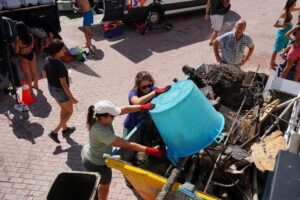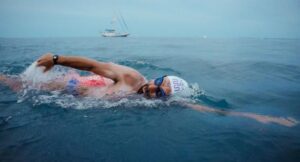
Small Island, Big Swim was an ambitious endeavor led by ultra-endurance athlete Neil Agius, in collaboration with Wave of Change and Zibel, aimed at raising awareness about the state of Malta’s marine habitat and inspiring a collective commitment to protecting the Mediterranean Sea. The project involved a record-breaking, non-stop swim around the Maltese archipelago, covering a distance of approximately 160 kilometers, and three clean-up events.
Objectives:
- Highlight critical environmental issues affecting Malta’s marine ecosystems.
- Inspire the public to engage in marine conservation efforts.
- Set a new world record for the longest non-stop, unassisted, current-neutral sea swim.
Description and Implementation: Neil Agius commenced his swim from Mellieħa Bay, proceeding southeast and clockwise around Malta towards Gozo, and then back. The planned route around the entire archipelago was 104 km, but Agius swam an additional 56 km to cover a total distance of 160 km. The challenge was expected to take him three days to complete. Throughout the swim, Agius remained in the water continuously, adhering to strict rules that prohibited physical contact with support boats. In collaboration with NGO Wave of Change and marine clean-up specialists Żibel, three clean-up events were organised to coincide with the swim, engaging the community in environmental stewardship.
Impact and Results: By undertaking this monumental swim, Agius aimed to draw significant attention to the importance of marine conservation in Malta. The initiative sought to inspire individuals and communities to take proactive steps in preserving the Mediterranean Sea. Additionally, Agius broke his own world record for the longest non-stop, unassisted, current-neutral sea swim, previously set at 125.7 km in 2021.
Conclusion and Recommendations: Small Island, Big Swim served as a powerful platform to promote marine conservation and environmental awareness. To maximise its impact, it is recommended to:
- Enhance community engagement through educational programs and workshops on marine conservation.
- Foster partnerships with local schools, environmental organisations, and governmental bodies to broaden outreach.
- Utilise media coverage and social media platforms to amplify the message and reach a wider audience.
- Encourage public participation in clean-up events and other conservation activities to instill a sense of collective responsibility.
Links
https://www.instagram.com/reel/DAKvECTobD9/?igsh=MWM2dGV3OHltdDMwbg==
https://www.facebook.com/share/p/18q85rVJfM/?mibextid=wwXIfr
https://www.instagram.com/reel/DASyxcZullC/?igsh=MXR6dndxMHZsa2ozbQ==
https://www.instagram.com/reel/DAI4BLKo2OH/?igsh=MWFhdG84bXZyZ2MxbA==

 .
.
